The Quiet Americans: On the Trump trail with America's Scots
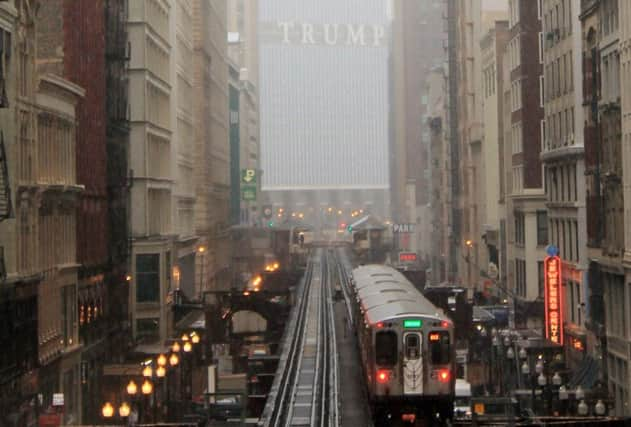

After his victories on Super Tuesday, Donald Trump has cast a shadow over American politics in the Presidential primary battle, but in downtown Chicago it is more than just a turn of phrase.
At the end of the city’s iconic Wabash Avenue, where its famous L train turns a hairpin corner, the gargantuan Chicago Trump Tower looms out of the mist and snow.
Advertisement
Hide AdAdvertisement
Hide AdAmerica’s third city has no shortage of voters with Scottish ancestry.
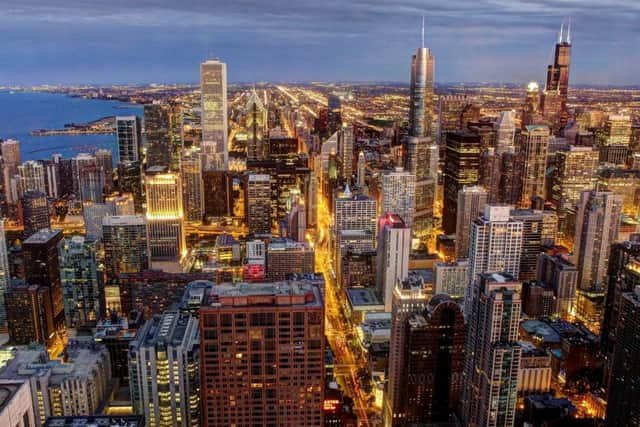

Home to a large chunk of the five million claiming direct Scottish heritage in the US, it is a multicultural metropolis with a diverse voter base.
This Tuesday, voters in Illinois will have the chance to air their views on the flamboyant tycoon.
Well ahead of nearest rival Marco Rubio, a win in the Illinois primary could virtually seal Trump’s Presidential nomination.
Can the Donald count on his fellow Scottish Americans for support in diverse and liberal Chicago, where thousands turned out to protest against his candidacy last weekend?
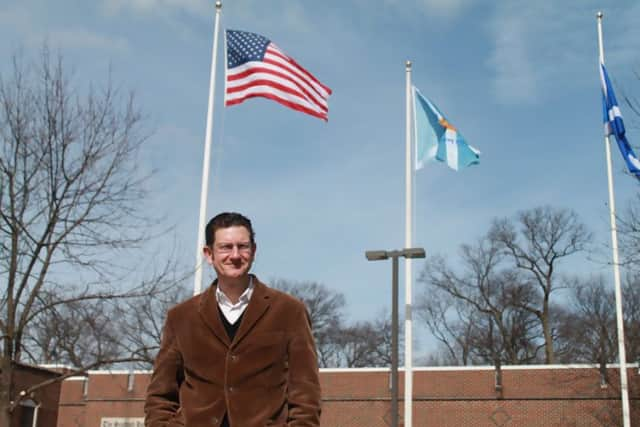

In a quiet suburb on the west side of town, the Scottish Home is a one of a kind building that has catered to newcomers and Scottish Americans alike for over a century, as the base of the Illinois St Andrew Society.
Finished in brick with touches of Scottish Gothic revival, the floors are carpeted in tartan and outside the Saltire flies proudly alongside the Stars and Stripes.
President Gus Noble is open-minded about what being Scottish American means today, politics included. “We say that you can be Scottish American by birth, by heritage or by inclination”, he enthuses.
Advertisement
Hide AdAdvertisement
Hide AdHis accent betrays his roots in Duns in the Scottish Borders, but he has lived in his adopted country as long as his childhood home.
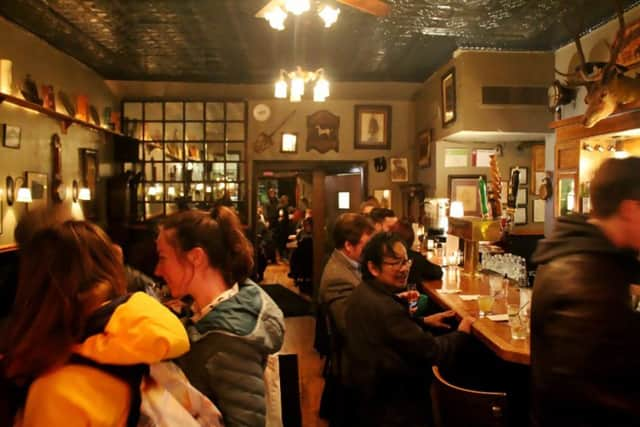

The Presidential election looms over both his professional and home life.
The Illinois Scots do not just celebrate culture but run a charity care home for elderly people, and like elsewhere in the US, public healthcare is almost non-existent.
Despite the reforms pushed through by Barack Obama, charities like the Scottish Home provide vital services for people in need, whatever their ethnic background.
The St Andrews Society itself has no political affiliation, but there are certain Scots values Noble says will guide people’s choices politically come polling day.
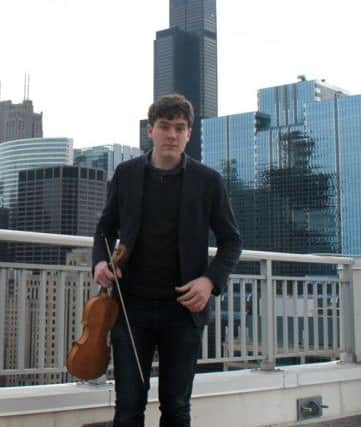

“The Scottish community has people of all politics, but there is a shared belief in education, enterprise and equality. Those are values shared by every one of the multiple Scottish identities out there”, he says.
“We were founded in 1845 on the principle that no deserving Scot in need should go without food, shelter or medicine, and that is a guiding philosophy.”
It is a kind of paternalism out of step with contemporary political sensibilities.
Advertisement
Hide AdAdvertisement
Hide AdIn a landmark policy speech Trump promised to roll back the meagre healthcare guarantees put in place by Obama and to block federal medical funding to states to reduce welfare dependency.
Many of those reliant on federal healthcare come from poor immigrant and African American families. Trump’s own mother Mary MacLeod emigrated from Stornoway to the US in the 1930s, when charities and immigrant welfare organisations like the Scottish Home filled the gap left by a lack of public assistance for poor newcomers.
As time wore on and the white, English-speaking Scots vanished into the fabric of middle class America their presence became less pronounced.


With the 2014 independence referendum though, America’s Scots were suddenly back in the political spotlight.
Centre of attention in Chicago for Scots and Scottish Americans alike was the Duke of Perth bar on the city’s north side. In a country packed with Scottish and Irish theme bars the Duke, as it is known, is the real deal.
The toilets are wallpapered with Oor Wullie comic strips and above the whisky selection sits an authentic police hat from Arbroath, donated by the owner’s cousin.
“It was kind of an accidental thing, my young cousin was a bobby visiting us from Arbroath and we wondered why the heck there wasn’t a Scottish pub in Chicago!” explains proprietor Jack Crombie.
Clad in a kilt (for the customers, he claims), he works the room at a specially arranged whisky evening, chatting to Americans in an accent that casually mixes Tayside and Illinois.
Advertisement
Hide AdAdvertisement
Hide Ad“The mood was good that night,” says Crombie of the independence referendum, “even if I wasn’t happy with the result.
“It was a very jolly amicable feeling. It was a great night for Scotland and a great night for democracy. I did what I could from here but it wasn’t enough.”
Crombie is a democrat in party terms too. A US citizen, he will be voting in the primary elections, though not for Trump.
“I’ll tell you a funny story”, he ventures. “When I left Scotland a very long time ago the last person I voted for was Margaret Thatcher. I flew to America and suddenly I was a commie.
“Here I am today and find myself a Bernie Sanders supporter. I have even sent money to his campaign and fully support his platform.
“But whoever out of Clinton or Sanders wins that nomination, they’ll be good for the country”, he says.
Bernie Sanders hopes that Chicago can help him overtake Hillary Clinton as each seeks to collect the most delegates. Sanders studied in the city in the Sixties and was an active part of the anti-segregation movement.
Crombie’s customers seem equally taken by the progressive Democrat’s surprise success. Annabel Rose is married to an American, but the avowed Sanders activist hails from Cumbernauld.
Advertisement
Hide AdAdvertisement
Hide Ad“This is the very first political race I have had not just an interest but an active involvement in. I support Sanders, I donate money to him. He speaks for working class people and we’re one of those households.
“We’ve got the t-shirt. I’ve been to a demonstration in downtown Chicago to rally support,” she adds.
“There is a younger generation coming through in America, people under forty are getting engaged. Right now we are pushing for $15 an hour minimum wages in Chicago. We think we can do something.”
She cannot yet vote in federal elections, but still thinks it is important to do her bit.
She compares her help on the Sanders campaign to her efforts in the independence referendum, with her status as an overseas resident leaving her unable to cast a ballot.
“I still spoke to a lot of people who could vote and I felt like I was still on the campaign trail. You can still be involved,” she adds.
Not everyone is a Democrat in Chicago. In a lunch restaurant in the city’s Lake View neighbourhood, three traditionally Republican voters who live in the city’s richer northern suburbs cannot decide who to vote for.
One of them is Sandra Smith, a self-identifying Scottish American as keen to talk about the Scottish-set TV series Outlander as she is the US primaries.
Advertisement
Hide AdAdvertisement
Hide Ad“I’d usually vote Republican but out of Ted Cruz, Donald Trump and Marco Rubio I couldn’t say who I would go for. Rubio is too slick for me and I just can’t see Cruz as President.
“As for Trump, I really am not sure what he stands for. In the past he has been really liberal on some issues and you get the impression he will say anything to win the nomination.”
Her lunch company agrees. For moderate Republicans there is a narrow field to choose from, and although they are no fan of tax increases they feel that the party has become too extreme.
They would perhaps even consider voting for Hillary Clinton over Trump come November, they admit.
Others are more relaxed about the fate of the presidency. Tim MacDonald is a prize-winning Scottish American fiddle player not long back from a trip to Edinburgh.
Originally from Pittsburgh in Pennsylvania - a state targeted by Sanders if he is to beat Clinton - Tim is open about the diversity hiding behind the headlines.
Tuning up on a Scottish-made violin in his downtown apartment, he says that American politics is more nuanced than people in Europe often portray it.
“I feel like it has been given over to sensationalism, the medium has become the message on both sides of the aisle. People are doing fairly extreme things to gain publicity.
Advertisement
Hide AdAdvertisement
Hide Ad“I know people who would love to be more like Europe and some people who think the European model is garbage. The range is pretty large,” he reflects.
“It is pretty close to fifty-fifty in terms of who might win, so we will have to see what the election holds,” he says, “but on a personal note I can say that Donald Trump is not well qualified to be the President. It doesn’t matter whether he is Scottish American or not.”
In Chicago, the Scots are still known as the ‘quiet immigrants’.
Trump may be lapping up votes amongst the Republican hardcore, but the question remains of whether his message can appeal to the more reserved corners of middle class America, Scottish or otherwise.